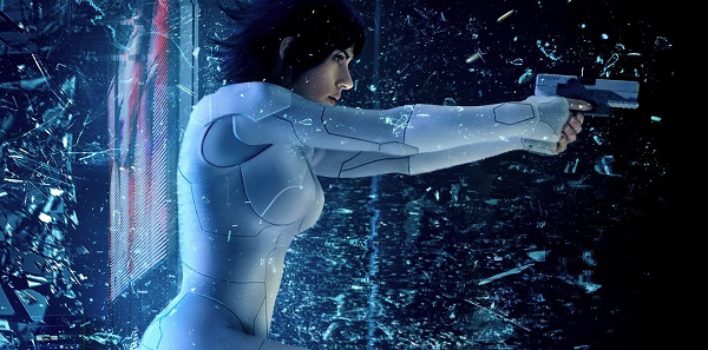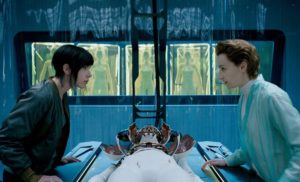Review| Ghost in the Shell
 Let me preface this review with a statement of fact: I don’t much care for anime. Like, at all. I despise it, really.
Let me preface this review with a statement of fact: I don’t much care for anime. Like, at all. I despise it, really.
In my view, anime has crippled animation stylistically and in terms of content for decades. So many animated shows and films (especially those geared toward children) have gone the anime route and contain stilted movement (except in fight scenes, of course), inarticulate mouths, overlong action cuts, blurred backgrounds, and other distracting flourishes meant to hide the lack of depth found in most of their narratives.
Now that I have got that out in the open, I think it’s safe to say that I didn’t have any high hopes for Ghost in the Shell. I do enjoy a lot of science-fiction though, especially cyberpunk stories, and there was something about the trailers and advertising that really intrigued me. I hadn’t seen the source material, so the concept was all new to me.
The short of it: I was entertained by Ghost in the Shell. It held my attention. And the ideas it expressed were very interesting and thought-provoking. But that doesn’t mean it’s a great movie.
SPOILERS AHEAD
Stuff I Liked
Kudos must be given to the set designers and art directors for the care they gave to create that world of Ghost in the Shell. It’s beautiful and familiar, yet at times otherworldly, and dangerous. It was a world one could get lost in, but might not want to.
From a design point of view, it reminded me of Blade Runner. A lot. There’s lots of over-commercialization and fantastical technology infused into familiar parts of life (holographic billboards and the like). However, Ghost in the Shell is definitely more pleasant to look at than Blade Runner, with its brighter color palate – not so much of a neo-noir feel.
The wizards at Weta and MPC created some stunning visual effects and makeup for Ghost in the Shell. I particularly salute the effects teams for using practical effects whenever they could. For example, Major’s thermoptic suit (which was a far better choice than the gratuitous nudity found in the anime) was created practically by Weta out of silicon, which was then augmented digitally.
Finally, the film’s score by Clint Mansell and Lorne Balfe is beautiful. It’s an 80s cyberpunk sci-fi smorgasbord of aural styles. There’s definitely some Blade Runner, RoboCop and TRON in there, which is great. And then layered on top of the 80s-tastic homage was a rhythm that was definitely of the current electronic style: intense and trance-like.
Stuff I Didn’t Like
Despite the beautiful visuals, amazing makeup and terrific score, this film suffers from a fatal flaw that kept me from loving it. Like most anime, the style hides the unlikable characters.
There should have been more thought given by director Rupert Sanders and the writers about characterization and pathos, so that believable people (artificial or not) could inhabit their beautiful futuristic cityscape. But then again, this could be a byproduct of the source material, so I’m trying not to be too harsh.
Let me put it this way: I cared more about the one-dimensional characters in Michael Bay’s Transformers movies that the ones in Ghost in the Shell. They were so unnecessarily dour and brooding with very few moments of genuine humanity and human emotion, which is ironic considering what the film is thematically saying.
The ending of the movie was too ambiguous, and, in some ways, made no sense. After coming to terms with her actual identity, Major went back to work at Section 9? She spent the whole movie fighting through the system to relearn who she was. Wouldn’t she rather spend her time re-establishing her relationship with her mother and pick up the pieces of her shattered identity? Did she go back out of loyalty to her teammates? It’s never really made clear.
Stuff to Ponder
Ghost in the Shell would have scored much lower on my scale had it not been for the interesting ideas it posits to the viewer. Like all good sci-fi, Ghost in the Shell uses its hyper-futuristic and technology-filled setting to convey a set of themes about the nature of humanity.
“Do you know that your bodies are temples of the Holy Spirit, who is in you, whom you have received from God? You are not your own; you were bought with a price. Therefore honor God with your bodies.” 1 Corinthians 6:19-20
The film’s world is one in which the line between man and machine is becoming blurred. People are “augmenting” themselves with technology – making them faster, stronger smarter – seemingly looking past physical limitations to become “better.”
This concept is very prescient in our own time, where technology seems to be growing by leaps and bounds and people are looking to technological advances to achieve a better way of life. This can be a great thing, like making a set of artificial legs to help a paraplegic walk again. However, Ghost in the Shell is set in a world that has taken a dark turn down the technological path.
Many today are not satisfied with themselves physically, which has lead to a rise in industries like fad diets and plastic surgery. This could even be applied to the controversial idea of transgenderism. In fact, in the world of Ghost in the Shell, it would be theoretically easy for someone to drop their mind into the artificial body of the opposite gender, or another race.
But would this complete transformation really lead to peace? Or, like other material “fixes,” would it simply open us up to still more ways we feel we fall short? There is much hubris in thinking that augmenting our bodies in some way will hide our true selves.
 In 2 Corinthians, Paul speaks about being given “a thorn in the flesh” (12:7), some kind of impairment by God. Paul concluded that this was to keep him humble and grateful for what he has. Later in the verse, God spoke to Paul and said, “My power is made perfect in your weakness.” We must be content with ourselves. If we spend our lives pining after things we want in us, we will not hear what God has to teach us.
In 2 Corinthians, Paul speaks about being given “a thorn in the flesh” (12:7), some kind of impairment by God. Paul concluded that this was to keep him humble and grateful for what he has. Later in the verse, God spoke to Paul and said, “My power is made perfect in your weakness.” We must be content with ourselves. If we spend our lives pining after things we want in us, we will not hear what God has to teach us.
The cultural focus on the material body can cloud us from looking to the eternal. There is something of us that is beyond the flesh of the material world, something that transcends our finite existence on this planet.
“…the dust returns to the ground it came from, and the spirit returns to God who gave it.” Ecclesiastes 12:7
According to the creators of Ghost in the Shell, what makes us human is something that cannot be manufactured or duplicated by synthetic means. The titular “ghost” is a person’s consciousness, their personality, their unique sense of self.
Even when there are artificial attempts to suppress or wipe away someone’s essence as a person, it eventually manifests. Major experienced “glitches” intermittently after her transformation; small pockets of her true self breaking through the fog of her artificial memories. It is something intangible within her psyche that cannot be denied.
Whether intended or not, this “ghost” is a reflection of the truth of the soul – the part of a person that goes on after death into eternity. We all know almost intrinsically that there is more to life than what we see, that we are specially created – not just clumps of molecules or a network of nerves.
The good news is that we are special, and were created with purpose by a God who knows us, fashioned us in our mother’s womb, and longs to be in a relationship with us and give us a path to a better life. This desire for the eternal we carry was sewn into us because we were created to connect with an eternal God.
“Surely God would not have created such a being as man, with an ability to grasp in infinite, to exist only for a day. No, no, man was made for immortality.” Abraham Lincoln
So What I’m Trying to Say is…
Ghost in the Shell is good, but not great. It’s definitely worth seeing once. It held my attention. Visually, the film is beautiful. It has an interesting visual dichotomy of beauty and grotesqueness. However, the characters keep the film from really taking off.
Beneath all the cyberpunk style and flash, there are some interesting questions being asked in Ghost in the Shell. It is a commentary on the undeniable truth that there is something within all of us that is eternal – that we were created to be more than flesh and bone.









